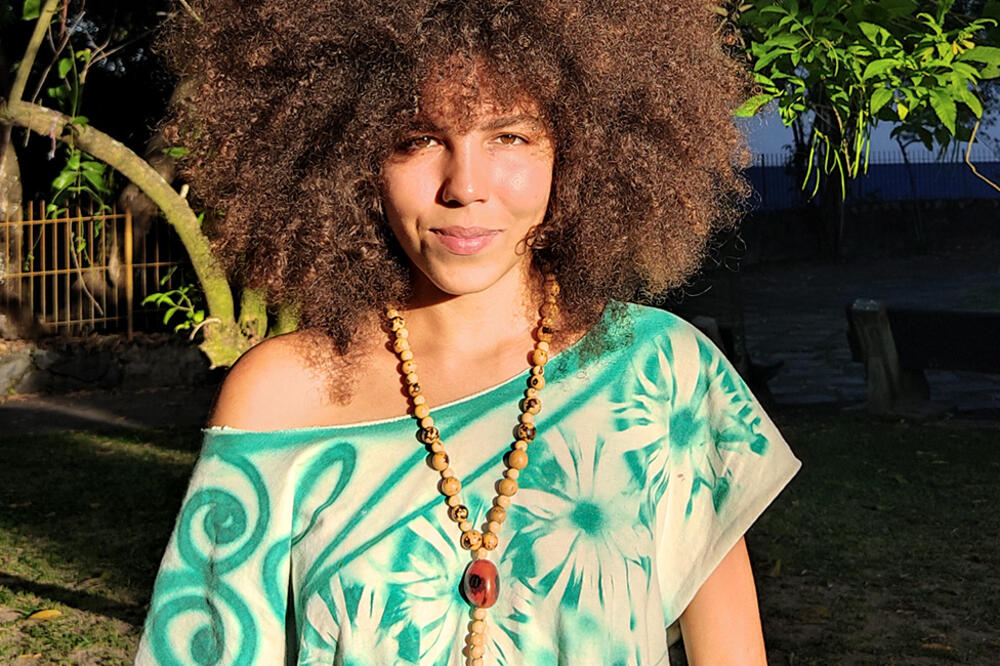Awareness of the climate crisis is generally higher in developed countries, but due to "climate anxiety" some couples in other parts of the world decide not to have children.
Žulija Borges' concern about climate change grew during the first months of the covid-19 pandemic, when she and others were isolated, alone with their own thoughts.
"I started imagining my city and my university under water," says the XNUMX-year-old agriculture and mechanical engineering student from Recife, a city on Brazil's northeast coast.
"I had anxiety crises, I even thought about giving up on life, because I didn't know how to deal with it all," she adds.
Taking a course on climate leadership didn't help much - it only increased her sense of responsibility for what was happening.
She soon decided that it would not be right for her to have a child.
"I cannot see myself as someone responsible for the life of another human being, to give birth to a new life that will be an additional burden on an already overcrowded planet," says Žulija.
- BBC 100 Women 2023: Who's on the list this year?
- Obama, Clooney and Gates: "We can eradicate child marriage in one generation"
- "You Become a Duty Robot": What is reproductive control and how common is it?
In 2022, a team from the University of Nottingham surveyed adult people in 11 countries whether, due to anxiety or worry about climate change, they thought they should not have children, or regretted having them.
The percentage of those who answered that they thought about it - sometimes, often or always - was between 27 percent in Japan and 74 percent in India.
The study should be published in 2024.
Earlier research, published in the Lancet journal, based on a 2021 survey of 10.000 people aged 16 to 25, found that due to climate change, more than 40 percent of respondents in Australia, Brazil, India, and the Philippines were doubtful that has children.
In France, Portugal, the United Kingdom and the United States, the percentage was between 30 percent and 40 percent.
In Nigeria, it was 23 percent.
An analysis of 13 studies conducted between 2012 and 2022, published this month by researchers at University College London, found that concern about climate change is typically associated with a desire to have fewer children.
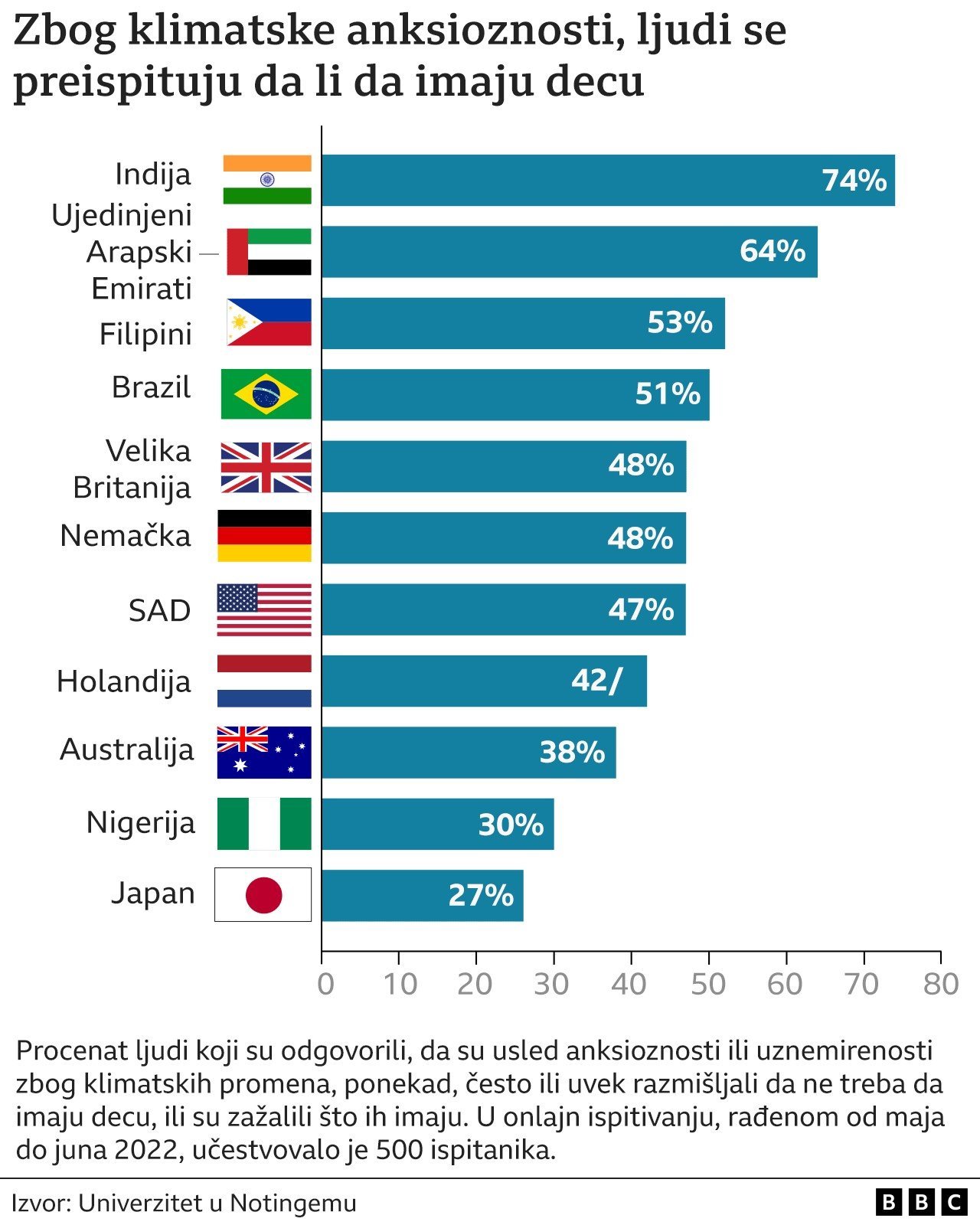
This attitude is usually due to the respondents' concern about the consequences that climate change can have on the lives of their children, because they feel, like Žulija, that a larger number of them will only be an additional burden on the resources of the planet.
However, researchers in two studies state that in Zambia and Ethiopia the prevailing view is that "families with fewer members are in a better position to support themselves in unfavorable environmental conditions".
Singer Miley Cyrus said in 2019 that she would not have children because of the state of the planet, and US congresswoman Alexandria Ocasio-Cortez asked on Instagram whether it would be right to bring children into a world devastated by climate change.
The same debate seems to be taking place in the countries most affected by the climate crisis.
Julia's worries about climate change were further heightened when a storm hit Recife in May 2022, causing floods and landslides and claiming more than 120 lives in the region.
"Just three days before those heavy rains, I gave a lecture to children from a local non-governmental organization on the topic of the climate crisis, right on the spot, because that area suffered the most damage from the floods.
"That really struck me, in terms of how can we think about children in the future if they are already at risk today?" he asks.
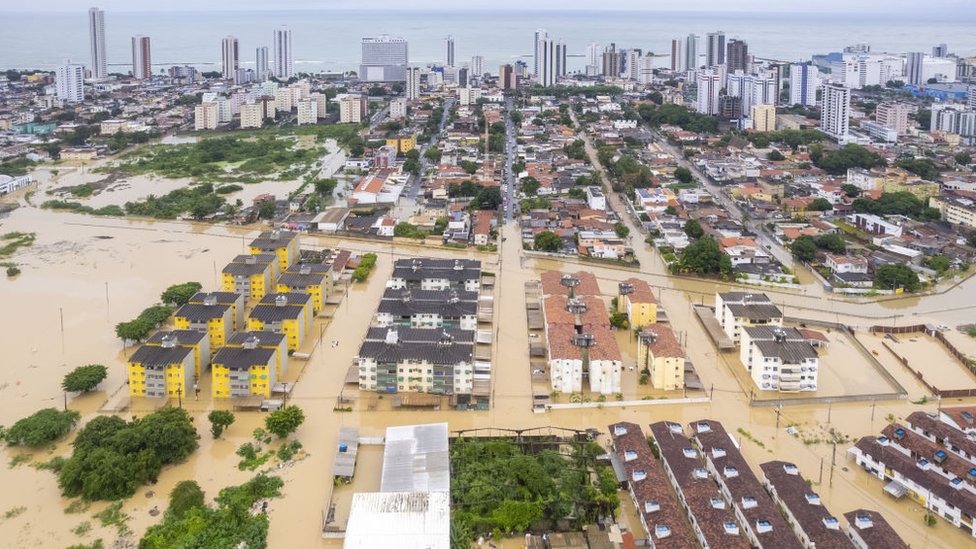
Two other women from countries quite far from Brazil are also strongly influenced by severe weather events that they attribute to climate change.
Shristi Singh Shrestha, an animal rights activist in Nepal, visited the village where her family lives this year and was horrified to see people starving due to the drought.
All their crops failed, and they couldn't find water even when they dug a well about 60 meters deep.
Meanwhile, in the neighboring district, an entire village disappeared due to floods.
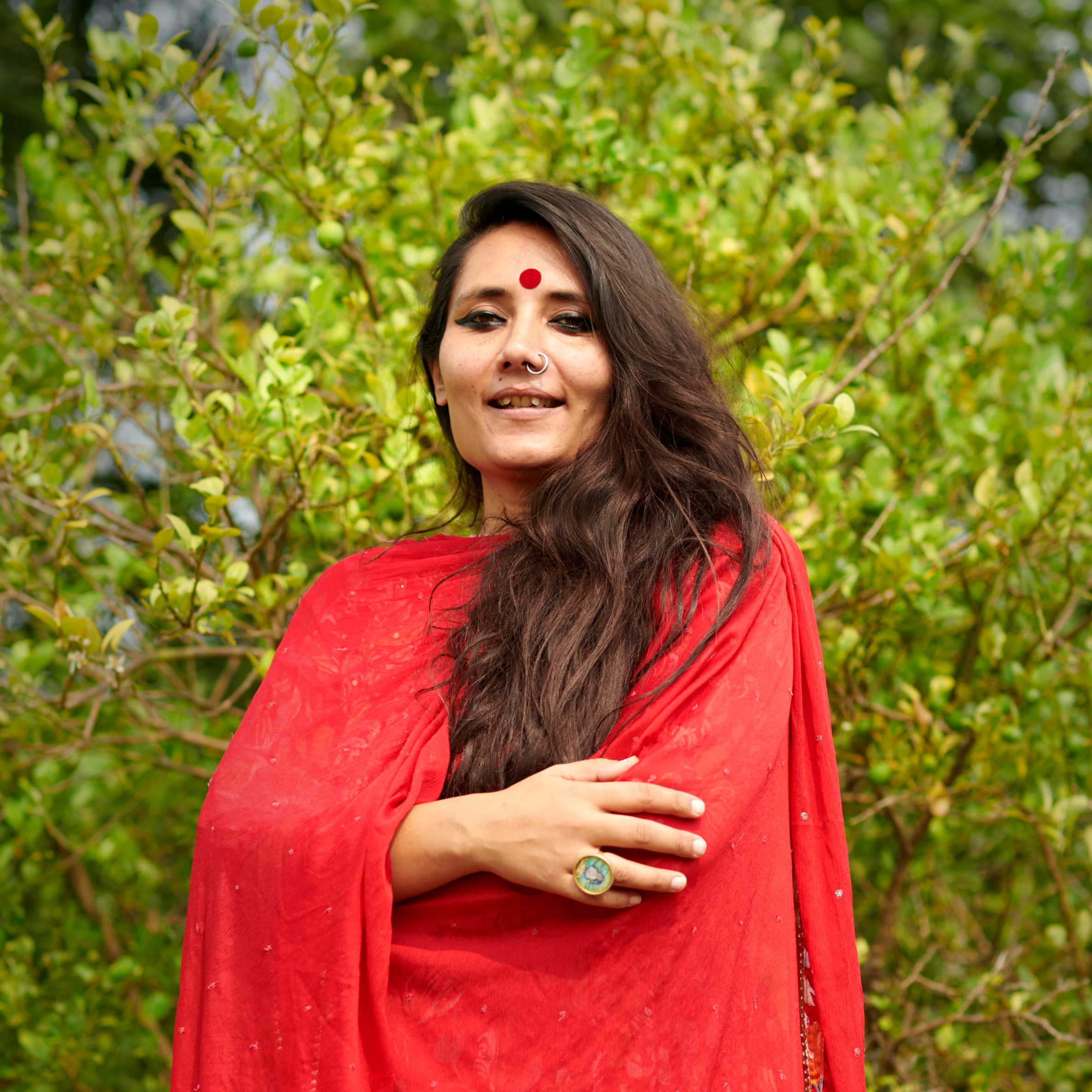
Forty-year-old Shristi has been concerned about climate change for a long time.
Eight years ago, she would have watched her newborn daughter sleep and worried about what kind of world she would inherit.
"Thinking about how this world works, how climate change is changing the lives of animals and children for the worse.
"I cried every day knowing that, it was pretty scary for me," she says.
Then she swore that she would have no more children.
After this new tragedy in the village, which caused parents to marry off young girls because they could not feed them, she did not sleep at night because she was consumed by climate anxiety.
What is climate anxiety?
Carolyn Hickman, psychotherapist, University of Bath
Climate anxiety or eco-anxiety is the healthy anxiety we feel when we see what is happening in our changing world.
Due to accelerated climate changes, we are facing threats to ourselves and the planet, and because of this we feel anxiety and fear for our own and our children's future.
It is not only anxiety, but also sadness, depression, pain, despair, anger, frustration, and confusion.
After filming a documentary in a coastal fishing community last year, twenty-four-year-old Ayomide Olude, who works at a non-governmental organization working on sustainability in Nigeria, is even more determined to never have children.
Residents of the settlement of Folua, 100 kilometers east of Lagos, showed her the pier, once a place for entertainment by the sea, but today it is almost completely submerged.
"During storm surges, rising water now penetrates deep into the countryside and people leave their homes.
"This place experienced a real real estate boom in the past, but now you see abandoned houses and some parts of the village are already under water," says Ajomide.
The fishermen told her that it was unsafe to work now, as the storms had become very strong.
Ayomide says he often hears young Nigerians discussing their angst at the "climate cafe" he runs in Ogun state, north of Lagos.
It's a place where people are encouraged to say what they know and how they feel about climate change.
The experience from Folu deepened her anxiety.
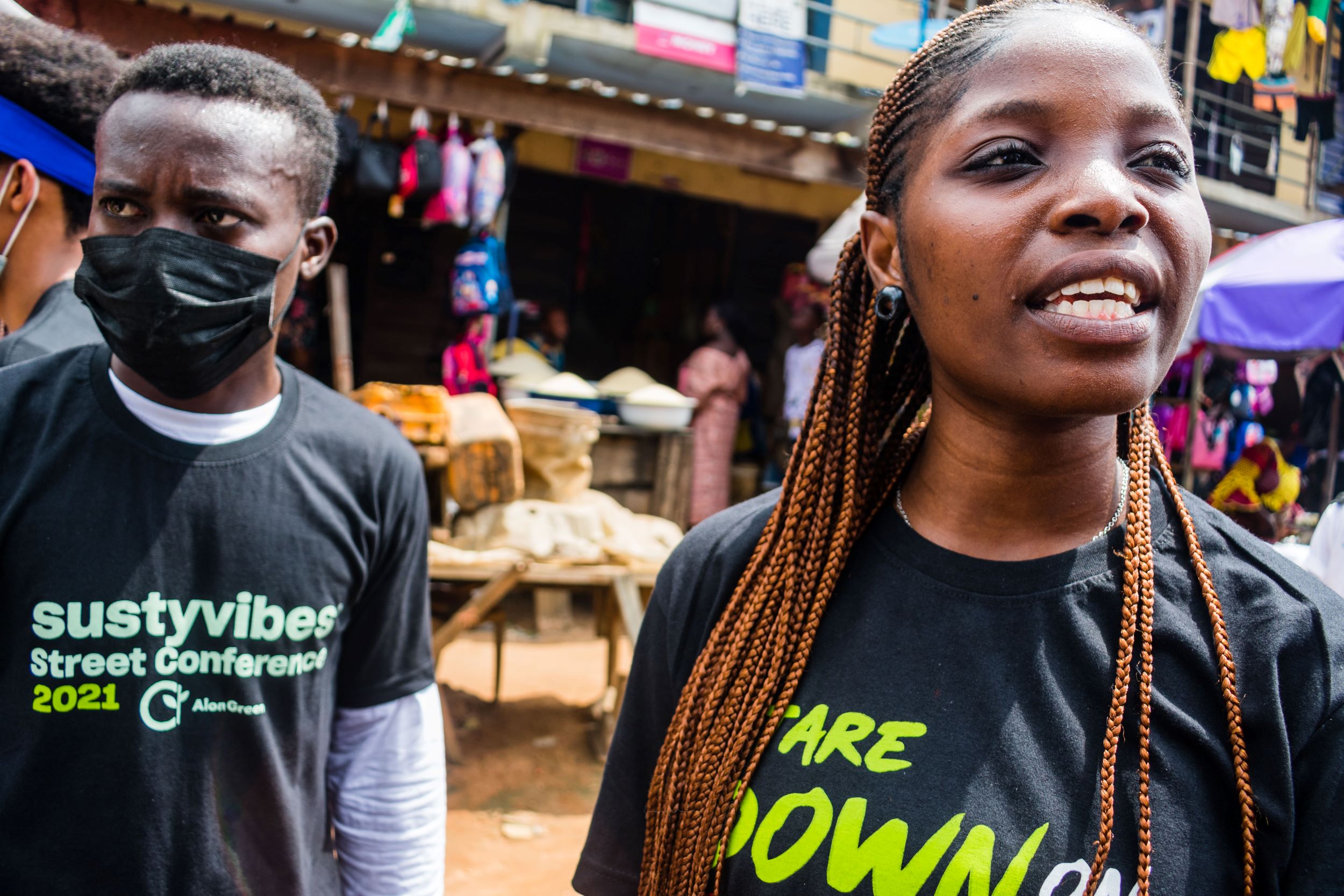
Like Julija in Brazil, she faces pressure from society and her family to have children, but says nothing will convince her to change her mind.
"In a society where women hardly have the right to make decisions and where there are religious beliefs that everyone should have children, it takes a lot of strength and determination to say it publicly.
"My parents are upset and we don't talk about it much, I try not to think about it, although I feel sorry for them," she says.
Shristi has to deal with relatives who keep asking her when she will give birth to another child.
But all three women say they have the support of their partners.
Carolyn Hickman, a psychotherapist at the University of Bath and lead author of a study published in the Lancet, argues that climate anxiety is a healthy response to the climate crisis.
He advises anyone suffering from this type of anxiety to connect with other people who feel the same way and to work with them to take practical steps to resolve the crisis.
"These difficulties will not disappear, so we should learn to face them," he adds.
How to deal with anxiety
- Being in a community of like-minded people and thus surrounding yourself with people with whom you can share feelings and thoughts.
- To learn how to control feelings so that there is neither overflow (too many feelings) nor closure (lack of feelings). Mindfulness and meditation can be helpful, as can anything else that helps build emotional resilience.
- There is a possibility to "reformulate" eco-anxiety into eco-care, eco-courage, eco-connection. We should not try to get rid of it, we feel eco-anxiety because we care. We should be proud because we care!
Carolyn Hickman, University of Bath
Žulija started this way.
She helped map areas prone to flooding and landslides.
He also collaborates with a local non-governmental organization that educates people about the climate and the environment.
"What helped me get rid of some of that anxiety was becoming an advocate for change and transformation in my community," she says.
But she is still worried.
"I still feel that despair, but I work with my therapist and talking about it helps."
Additional reporting by Paul Adamo Idoet

BBC 100 Women the team makes a list of 100 influential and inspiring women from around the world every year.
Follow BBC 100 Women on Instagram, Facebook i Twitter.
Join our conversations using the hashtag #BBC100Women.
Also watch this video:
Follow us on Facebook,Twitter i Viber. If you have a topic proposal for us, contact us at bbcnasrpskom@bbc.co.uk
Bonus video:



